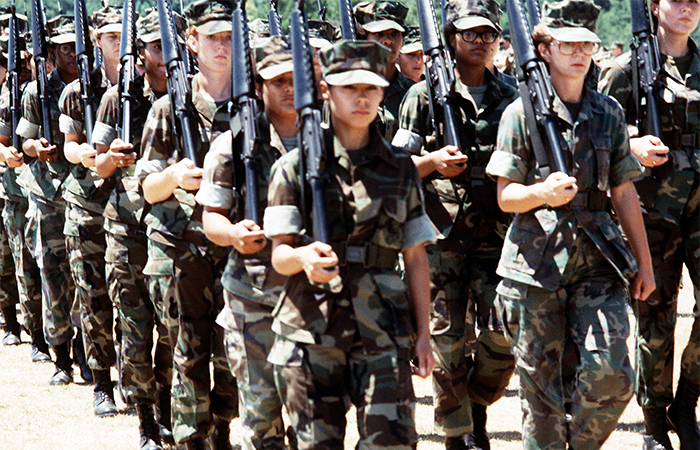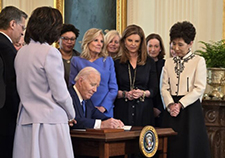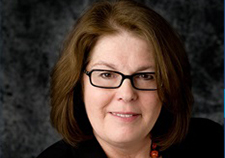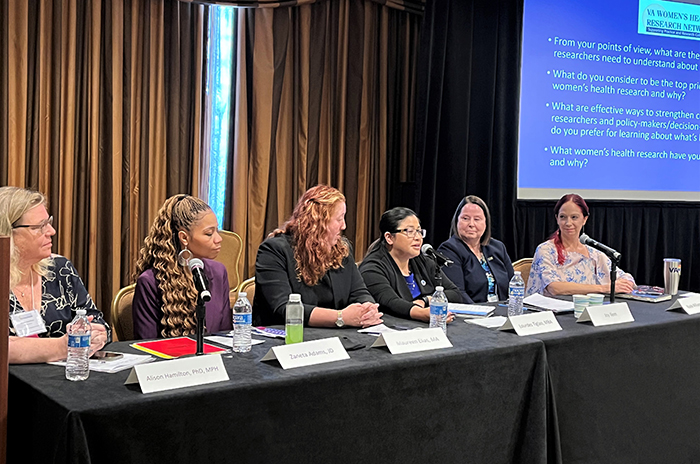Office of Research & Development |
 |


The Marine Corps’ first all-woman drill platoon marches in formation at Quantico in July 1985. Photo for illustrative purposes only. (Photo by SGT. Gruart, via National Archives)
September 26, 2019
By Tristan Horrom
VA Research Communications
"Military sexual trauma is an important issue affecting the health and well-being of women Veterans across the lifespan, not just limited to younger women and recent service eras."
A history of military sexual trauma is common in older women Veterans, according to a study focusing on women Veterans age 55 years and older. Also, women who experienced military sexual trauma were more likely to report multiple health conditions, especially mental health issues.
“Military sexual trauma is an important issue affecting the health and well-being of women Veterans across the lifespan, not just limited to younger women and recent service eras,” says study leader Dr. Carolyn Gibson of the San Francisco VA Health Care System and the University of California, San Francisco. “A history of MST is common among older women Veterans, and may contribute to mental health concerns and age-related health issues. This highlights the importance of trauma-informed care approaches for women of all ages.”
The VA study, reported at the annual meeting of the North American Menopause Society in September 2019 and published online in the Journal of General Internal Medicine on Nov. 11, 2019, is the first to focus on military sexual trauma in an older population.
While the effects of military sexual trauma on younger women Veterans have gained increasing attention lately, past trauma is often not considered during care for older women, according to the researchers. The results illuminate “the importance of trauma-informed care approaches for women across the lifespan,” they write.

Executive Order for Women’s Health built on VA research

VA Researcher Named One of U.S.’ Top Female Scientists

2023 VA Women's Health Research Conference

Self-harm is underrecognized in Gulf War Veterans
Military sexual trauma (MST) refers to either sexual assault or repeated, threatening sexual harassment during military service. It increasingly has been recognized as a problem in the U.S. armed services. National VA data suggest that one in four women Veterans or service members have experienced MST. Studies in which participants were anonymous suggest that the number may be even higher. Research has shown that MST can lead to a number of adverse health conditions, both physical and mental. Conditions commonly associated with MST include PTSD, depression, obesity, and chronic pain.
However, almost all research into MST has focused on younger women from recent service areas, such as Afghanistan and Iraq. Not much is known on how MST has affected older women who served during previous military conflicts.
To address the gap, the researchers studied data on more than 70,000 women Veterans age 55 or older who received care in VA between 2005 and 2015.
The team found that 13% of the women in the study screened positive for MST. Women who had experienced MST were more likely to have a wide variety of medical conditions, especially mental health diagnoses.
The women who screened positive for MST were more than seven times as likely to have PTSD, compared to women not who did not screen positive. This group was also twice as likely to have depression and suicidal thoughts.
MST was also linked to higher rates of a range of other medical conditions, particularly sleep disorders and pain. Risk was also greater for anxiety, substance use disorder (including alcohol and opioids), and obesity.
The findings are consistent with previous research linking MST increases to increased risk for these conditions. The study shows that older women Veterans have similar risks as their younger counterparts.
One particular finding was new in the VA San Francisco study. While previous research has linked MST to many medical conditions, this study was the first to link it to sleep apnea. Sleep apnea is common in older women, say the researchers, but is often under-recognized.
More research is needed on the prevalence and effects of MST, say the researchers, especially in the under-studied population of older women Veterans. MST is often underreported in all age groups. Gibson explains that while nearly all women from any age group who receive care through VA have been screened for MST at this point, this screening only asking about MST once. Women often do not disclose MST the first time they are asked, suggests previous research. MST reporting rates may have increased in recent years because of increased cultural recognition of sexual harassment and assault in the military. Also, the majority of women Veterans do not get care through VA, meaning they may not have been screened for MST.
Since the late 1990s, VA research has been at the forefront of advancing knowledge about the prevalence and impact of MST on the health and functioning of women Veterans. According to Gibson, “this research highlights the importance of several VA priorities, including routine screening for MST, depression, and PTSD; primary care–mental health integration to reduce stigma and increase access to mental and behavioral health; strong mental health programs providing evidence-based trauma-focused treatments; and an emphasis on trauma-informed care in all settings.” The research emphasizes the importance of these practices for women Veterans “no matter how long ago they separated from service,” she says.
Gibson and her colleagues are continuing to build on their findings. A survey study of midlife women Veterans age 45 to 64 is currently underway to provide additional insights on the prevalence of MST. The follow-up study will look at the differences in prevalence and impact of sexual harassment versus sexual assault during military service, among other outcomes.
To learn more about VA research into MST, visit the Women’s Health topic page on the VA research website.
VA Research Currents archives || Sign up for VA Research updates